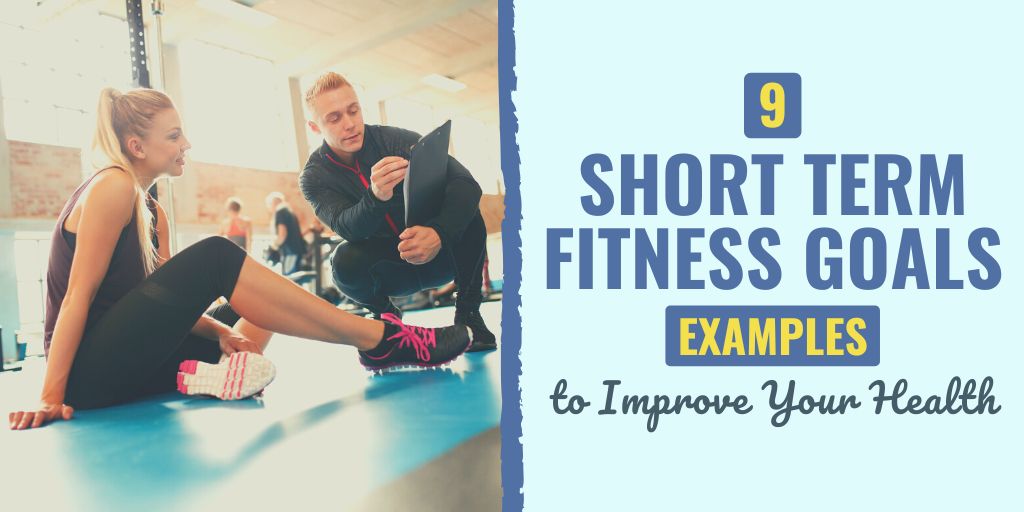There might be affiliate links on this page, which means we get a small commission of anything you buy. As an Amazon Associate we earn from qualifying purchases. Please do your own research before making any online purchase.
If you’re aiming to improve your health, you probably wish you could have an overnight transformation. But as you know, it takes a lot of work (and time) to reform your body, which can feel frustrating if you aren’t getting the quick results that you want.
To reduce these feelings of frustration, you need to have short-term goals that are easily achievable to help you recognize your progression so you know that your hard work is moving you in the right direction.
While small goals are frequently overlooked and seen as being too easy or insignificant to contribute to a lasting change, these are the goals that will help you attain the big results you’re looking for in the long-run, so they shouldn’t be ignored.
Taking stock of your little victories is the key to long-term goal achievement. Watch the video below for the 3-step process you can use to start celebrating those small wins.
Short-term and long-term fitness goals are very different from each other, but they are both critical to your success. Both of these types of goals will also help you make great strides toward achieving the fitness level, body, and health you’re aiming for.
In this article, we are going to look at the difference between short-term and long-term fitness goals, and then I’ll give you nine examples of short-term goals you can make that will help you see the progress you’re making on your journey to a healthier body.
Let’s get started by taking a more detailed look at what a short-term fitness goal might look like.
What Is a Short-Term Fitness Goal?
Short-term fitness goals are milestones that can be attained in a relatively short amount of time (usually 6 months at the most) and will bring you closer to achieving your ultimate vision of success. These goals are typically more specific to your individual needs or schedule than broader, long-term goals.
Often, ‘overhaul’ fitness programs are neither individualized nor sustainable because they don’t take the various stages of planning, change, and the required support for success into consideration, but your short-term goals are all about what you need to do right now to succeed.
Depending on how “short-term” your goal is, you can achieve it by the end of the week, month, or six months, which is much shorter than your long-term or “lifetime” fitness goals will take.
Your long-term goals will not only take more time, but they will also take more patience, willpower, and perseverance to achieve. Both of these types of goals are equally as important as one another and neither should be ignored if you want to achieve your ideal level of fitness.
The truth is that your long-term results are based on the small decisions that you make each day, and if you want to improve the results that you are getting, then you need to set short-term goals.
Even Olympians say that you may set your sights so high that your goals seem unattainable, but focusing on the process through short-term goals will help you build the skills that you need to help you get where you’re going.
Let’s take a quick look at some lasting benefits that you will get from your short-term fitness goals that will help you reach your ultimate goals later on.
Direction
“Fitness” is such a broad subject that encompasses a variety of factors, including strength training, balance, agility, flexibility, endurance, etc.
With all of the directions you can go, it’s easy to experience analysis paralysis, where the overwhelming number of options can make you indecisive, causing you to choose to do nothing.
By picking a short-term goal, you can focus on one element of improving your fitness at a time. For example, you can set a goal of being able to complete a certain number of pushups if you’re working on strength training and leave your cardio workout for another time.
Once you’ve made progress in one fitness domain, you can either expand that goal or start working on a different goal, such as flexibility. Your short-term fitness goals can provide you with the structure and sense of direction to help you focus on one thing at a time.
Growth
The more short-term goals you have, the larger your skillset will become. This will make it easier to accomplish your goals quickly and efficiently.
You will learn a lot about yourself while you’re working on your short-term goals, such as your patience level and your ability to persevere, in addition to how you can keep yourself motivated.
When you look at your growth through the lens of your short-term goals, you will be able to perceive any struggles you’ve faced as being a blip on the radar rather than the end of your journey.
It takes dedication to accomplish short-term goals on the micro level, but when you finish several of them, you will notice growth that would have otherwise been impossible to achieve.
The series of small wins that comes along with achieving your short-term goals will make you feel better about the longer process of achieving your dreams. This series of minor milestones will keep you motivated on your way to realizing your vision.
Momentum
Short-term goals can be accomplished quickly, which makes you feel good and helps you keep up the momentum you need to succeed. The more short-term goals you finish, the more invested you will be in accomplishing your goal.
You will be constantly striving toward making improvements with this sense of momentum and your risk of experiencing burnout will be much lower than if you were to only focus on long-term goals.
For example, it can be hard to notice progress when you’re working toward losing 75 pounds, but if you just focus on losing a pound or two a week, you will keep up your enthusiasm.
Now that you know why you need short-term fitness goals, let’s look at some examples that you could focus on for yourself.
9 Short-Term Fitness Goals Examples to Focus on Next
One quick note about your goals: you want to make sure to follow the SMART goal format. This way, you will know when you’ve completed one goal and it’s time to move onto the next. This will also help you keep your goals organized so you stay on track.
1. “I will run a 10K in five months by training on Tuesday and Thursday mornings before work and on Saturday afternoons.
2. “I will lose 15 pounds in 3 months by replacing soda with water, exercising for at least 150 minutes per week, and limiting eating out to once a week.”
3. “This week, I will use my smartwatch to measure my steps and burn at least 1,500 calories just by walking.”
4. “I will do daily stretching in addition to one hour of yoga twice a week to be able to do the splits within 12 weeks.”
5. “I will reduce my body fat by 20% within the next six months by keeping a food journal and signing up for a HIIT class at the gym.”
6. “I will do upper body strength training three times a week in order to be able to complete 12 consecutive chin-ups within the next six months.”
7. “I will gain three pounds of muscle mass in the next six months through weight training and increasing my protein intake.”
8. “I will reduce my LDL cholesterol by 20 points within the next year by limiting my intake of saturated fat, eliminating trans fats, increasing my activity level, and reducing my consumption of alcohol.”
9. “I will use pace charts to hold myself accountable for making incremental speed improvements for the next six weeks in order to run a 6-minute mile.”
Final Thoughts on Short-Term Fitness Goals
One of the beauties of short-term fitness goals is that they can compound to improve your overall health, even if you only focus on one at a time.
After you’ve finished a few of your short-term goals, you will gain confidence in yourself, which will increase your ability to handle whatever fitness challenges come your way.
Growth is ultimately about being consistent and dedicated, and there’s no better time to get started than right now. So tailor any short-term goals listed in this article to your own situation to help you get started moving toward a longer-term improved version of yourself.
Now, if you're looking for more examples and other fitness inspiration, here are some articles to check out:
- 13 SMART Fitness Goals Examples That Will Motivate You
- 11 Vision Board Ideas & Examples for Weight Loss
- 13 Top Fitness and Exercise Habit Books
Finally, if you want to take your goal-setting efforts to the next level, check out this FREE printable worksheet and a step-by-step process that will help you set effective SMART goals.

Connie Mathers is a professional editor and freelance writer. She holds a Bachelor's Degree in Marketing and a Master’s Degree in Social Work. When she is not writing, Connie is either spending time with her daughter and two dogs, running, or working at her full-time job as a social worker in Richmond, VA.


